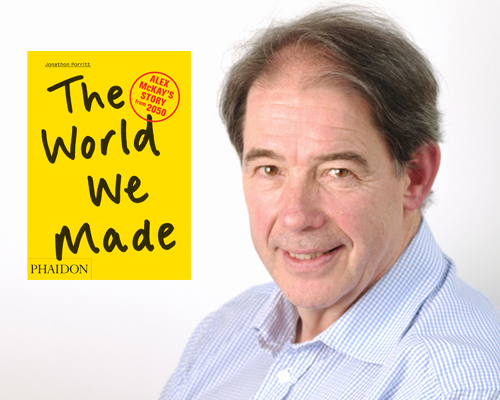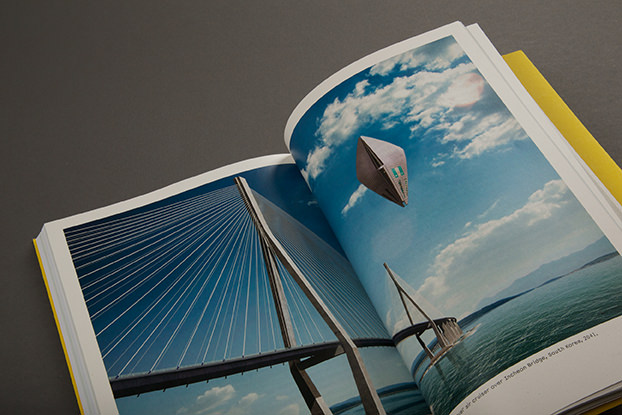The World We Made aims to be the most sustainable book of its kind.

Article featured in Green Futures 91, January 2014. By Duncan Jefferies.
It’s often assumed that e-books are the most environmentally friendly form of the written word, but that’s not necessarily true. As shown by the production of Jonathon Porritt’s new book, The World We Made, a paper-based book that is sustainably designed and printed can have less of an impact on the environment than an electronic equivalent; it all depends on what criteria we use to define their sustainability.
Jonathon Porritt’s book is written from the perspective of Alex McKay, a history teacher looking back from the year 2050, reflecting on the technological, environmental and social challenges that had to be overcome to create a world that works for the majority of people.
As Jonathon says,
“A brilliant, fairer and genuinely sustainable world is still available to all of us by 2050 – if we start making it happen right now. So it was particularly important for me to leave no sustainable stone uncovered when producing, creating and manufacturing this book.”
Arjowiggins Graphic, a manufacturer of environmental paper solutions, and Pureprint Group, an award-winning print and marketing company, therefore set out to create the most sustainable book of its kind. Printing The World We Made on four different types of 100% recycled Forest Stewardship Council (FSC) certified paper reduced its environmental impact by:
- 17,120kg of landfill
- 371,887 litres of water
- 35,013kWh of electricity
- 3,105kg of CO2 and greenhouse gases
- 27,817kg of wood
according to Arjowiggins Graphic’s Environmental Benefit Statement, which shows savings made by using recycled papers compared with using virgin fibre papers (non-recyled papers).
“The average CO2 emissions for a book is around 4kg of CO2, so we’re proud to have created a book that produces less than half of this amount”,
says Angela De Vorchik, Operational Marketing Manager, Arjowiggins Graphic.
“Not only does this reduce the book’s carbon emissions and divert waste paper from landfill but it also provides a really simple way to communicate its commitment to the environment.”
For the printing process, Pureprint Group, a carbon-neutral company based in East Sussex, used inks made from vegetable-based oils, and no isopropyl alcohol (which creates toxic emissions) was applied, in order to reduce ground-level ozone. Pureprint also diverts 99.5% of all its waste from landfill, only uses electricity produced from renewable resources and was awarded the Queen’s Award for Enterprise for Sustainable Development in 2013. The book was dispatched directly from the printers to warehouses in the US, UK and Australia to cut out any unnecessary transportation. Climate Care then offset residual emissions (1.8kg per book) to make it completely carbon neutral.
So, a big improvement on your typical printed book then – but how does this compare with an e-book? Apple has stated that the total life cycle of an iPad 2 will produce 130kg of CO2 emissions, which equates to the CO2 emissions from about 32 books (based on the average of 4kg of CO2 per book across the publishing industry), or 72 copies of The World We Made. That’s roughly the number of books you’d need to read on an iPad or other e-reader to realise its environmental benefits over a printed book.

Many tablets and e-readers also contain rare earth elements, which are typically obtained in ethically unsound ways from warring regions of Africa. What’s more, these devices are often manufactured in China under working conditions that would be considered unacceptable in the West. And they’re typically upgraded well before they reach the end of their useful life, with last year’s model ending up in landfill or a toxic e-waste dump in the developing world.
That’s not to say the printing side of the book business is perfect – far from it. Around 40% of all the books published each year end up pulped, and there’s still a way to go before all the paper used by publishing industry is the recycled kind championed by the Arjowiggins Graphic, sourced from certified suppliers like the FSC. But as the production methods employed on The World We Made demonstrate, truly sustainable printed books need not be classified under ‘fiction’.
Arjowiggins Graphic and Pureprint Group are Forum for the Future partners.
www.recycled-papers.co.uk
www.pureprint.com